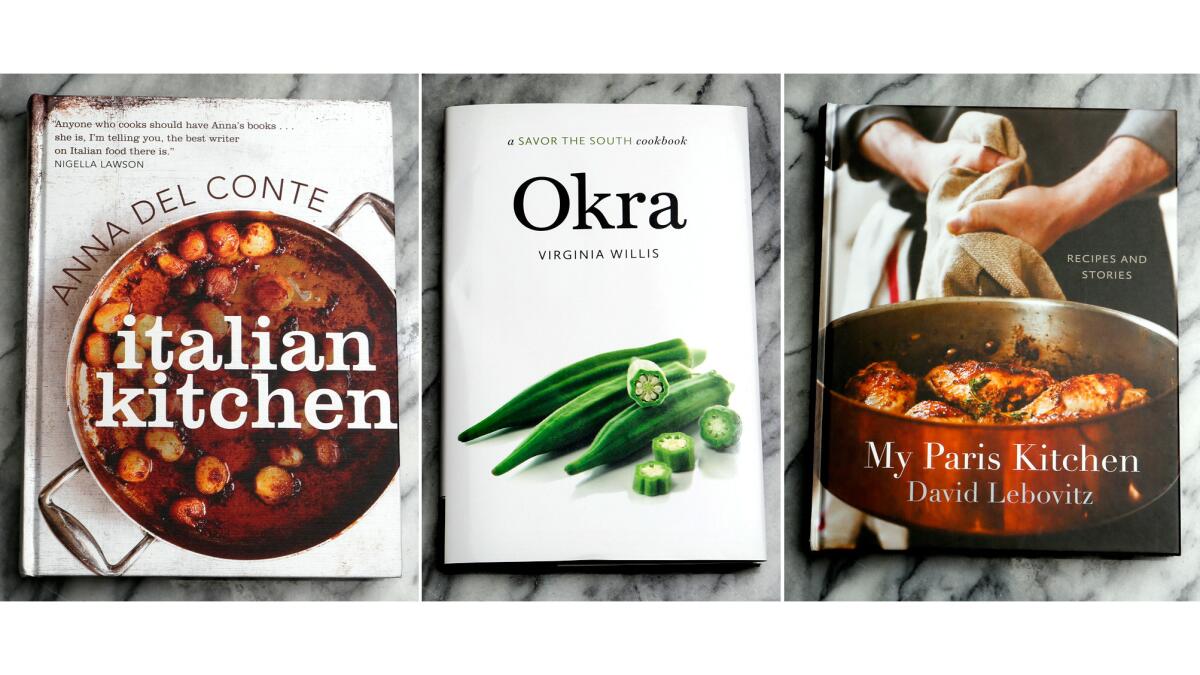California Cook: ‘Okra,’ ‘Italian Kitchen,’ ‘My Paris Kitchen’ are tasty summer reads

- Share via
Summer is the cruelest season for cookbooks. Caught between the spring fling and the holiday onslaught, it’s easy for a good book to get ignored.
But for all the talk about how the cookbook market is shrinking — and despite the fact that sales figures tend to support that argument — I’m always surprised at just how many really good books still find their way onto my desk, no matter what time of year.
And by good books, I don’t mean big, glossy coffee-table jobs, or even big books by celebrity chefs. There is still room for a wonderful little book that captures a specific subject, for a re-appreciation of a too-often-overlooked author, or for a writer with a quirky, individual voice.
Here are three books published this summer that I found especially appealing:
Okra can be a challenge even for good cooks. Thank goodness there’s a great cook like Virginia Willis here to help those of us who love to eat it but have been challenged by cooking it. An Atlantan and therefore someone fully familiar with the slimy pod, Willis has written a new cookbook, “Okra,” part of the University of North Carolina Press’ splendid “Savor the South” series, that finally gives the vegetable its due.
The book starts with a long essay, an “ode to okra” as Willis puts it. A breakdown of heirloom varieties, Southern history and a nice little botany lesson follow. And, yes, there are tips on how to keep okra from being overly mucilaginous. To simplify: Choose small pods. Wash and dry very thoroughly. Don’t cut it up unless absolutely necessary, and then wipe your knife between cuts to reduce the slime factor. Cook it with an acid, such as tomato or wine. Above all, don’t overcook it.
The recipes run the gamut from Southern standards such as black-eyed peas and okra to inventions such as “Southern sushi” (okra and cream cheese wrapped in country ham). I particularly liked the quick-pickled okra that, Willis points out, is perfect for replacing green olives in “Southern-style martinis.”
Marcella Hazan is quite rightly regarded as the queen mother of Italian cooking in the United States. In Britain, that title probably goes to Anna Del Conte, a writer who is far too little-known here. Like Hazan, Del Conte’s food exemplifies the kind of simple, sophisticated technique that informs so much of great Italian cooking.
Her new book (at least new in the U.S.) is called “Italian Kitchen,” and it’s a compendium of recipes from four smaller books that were published in Britain back in the early ‘90s. You won’t find many elaborate constructions or flashy fusion ingredients in her recipes. What you will find are simple ingredients treated with respect.
Take her recipe for baked zucchini, for example, one that has already made its way into my regular rotation. On the surface, it’s dead simple: You coat zucchini with mint and garlic and bake it until it browns. The trick here — if you can call it a trick — is that she salts the zucchini before roasting, which pulls moisture and partly “cooks” the squash, giving it a firm, silky texture. Try it and you’ll see what I mean.
Bookshelves are full of romantic odes to French cooking — or at least French cooking as it once existed. But too often what’s missing is the messy texture of real life, where cuisines don’t exist in time capsules but are constantly changing, just as the contemporary cultures around them are.
You get that up-to-the-minute feeling from David Lebovitz’s “My Paris Kitchen,” which is full of recipes that feel like they came straight from a dinner party thrown by that super-chic friend who lives in a great apartment in the Third.
Lebovitz has a blog that’s popular enough to be called cult-like. A former cook and pastry chef at Chez Panisse, he’s been in Paris long enough to understand how people really live. In that way, this book reminds me of the late Michael Roberts’ great “Parisian Home Cooking.” So you get traditional French recipes such as brandade and aioli, but there are also recipes that reflect modern Paris — the Middle Eastern egg dish shakshuka and his spin on Parisian Texas barbecue, caramel pork ribs.
Geeky about food? Follow @russ_parsons1
More to Read
Eat your way across L.A.
Get our weekly Tasting Notes newsletter for reviews, news and more.
You may occasionally receive promotional content from the Los Angeles Times.











